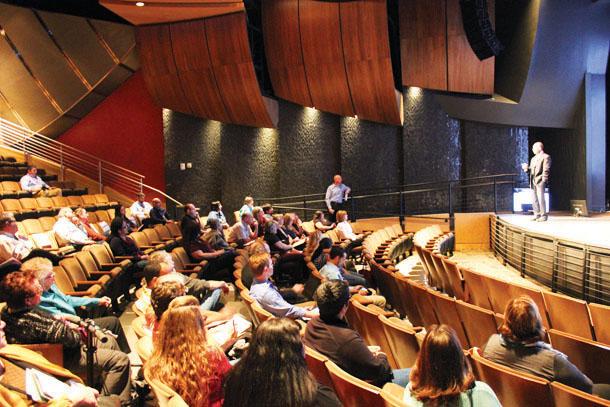Former democratic state Sen. Dean Florez, 51, introduced The Michelson 20 Million Minds Foundation and spoke about where technology should be heading within the higher education system during the Technology Conference at the Bakersfield College indoor theater Feb. 5th.
Florez, who was the keynote speaker, started off the conference speaking about the high cost of schoolbooks, particularly in our community college system, and how the 20 Million Minds Foundation has begun to create an open source system where books of various different subjects are available for free use for any student and faculty who choose to use it.
“Our goal at 20 Million Minds is to create an open source textbook library and creating savings for the students,” Florez said. He encouraged students and faculty to take interest in the money-saving opportunity.
However, Florez’s visit to the BC campus was mainly geared toward the innovation of technology in the classroom and the ways that BC faculty and the community college system can incorporate new technologies to create a hybrid learning mechanism that utilizes traditional teaching and the incorporation of technology to attain a more effective way of learning.
Florez expressed his high regard over a competency-based education, and how he sees this as a solution for the skills gap that there is between college graduates and the competing workforce.
Florez explained how recent studies suggested that when asking college leaders if their students had the right skills needed for the workforce that about 95 percent said yes. Then they asked CEOs and other business leaders, and only 11 percent felt that college students were ready to take on the workforce.
“If you really think about it, we have a huge gap in perception,” Florez said. “The workforce is saying that our students aren’t prepared and then our colleges are saying that they are.” Florez believes that the solution to this skills gap relies on technology and “the new online.”
Florez explained how a competency-based education, which is a concept where students can demonstrate attained knowledge, as opposed to earning credentials through seat time based on credit hours, can benefit a students way of learning by merging education with new online technology.
Florez pointed out that every student works at their own pace and the fact that higher education institutions continue to measure learning through credit hours highly weakens our education system.
“We want to give credit for what you’ve actually learned and not necessarily credit for how long you spend in class,” Florez explained.
Florez’s proposed idea would involve a hybrid of education and an online system where students can learn in a self-paced environment. Florez encouraged that faculty uses their own knowledge and incorporates it with technology to create their own system to teach their students and to stop relying on textbook corporations from choosing what they should teach.
Florez went on to state that the federal government would be closely looking into competency-based education this upcoming year. Florez explains that our education system is a tough and old system and that the fact that both the Republican and Democratic parties agree that there needs to be an update in our education system is a win on its own.
Although a competency-based education relying on an online system seems like a step forward in our education system, there are some that are hesitant to the idea. Bakersfield College mathematics professor Janet Tarjan expressed her hesitation on competency-based online education and her worries that those in power are focusing more funds and attention to an online-based education instead of the classroom.
“It worries me because you’ve got the power, I don’t, I’m in a classroom with kids that I care about, that I adore, and that I am busting my butt to help become a successful person like you are,” Tarjan directed at Florez. “I want you, the person that is a successful person from our valley, and Rudy Salas and Shannon Grove and everybody who is our representative in the legislature to do their job visiting the classrooms and knowing what’s going on in the classroom and understand that there is a place for online, but there is also a place for a classroom teacher, and some of the money that is going to online, needs to hire more faculty to have better experiences so that kids can find out they belong in higher education.”
Florez justified his stance on competency-based education by stating that he agrees with Tarjan and that more faculty should be hired. Florez continued to say that the main focus of the “new online” is to find a balance in the system where both online technology and the traditional way of teaching can merge to find a medium.
Florez closed out the conference by continuing the idea of the next generation education, “A student can take some course, drop out for a bit, if you will, or go on to whatever they’re doing in their work environment and come right back to where they left off. It’s a system made for credential learning,” he explained. “The world of content and the world of having closed types of books are really gone. It’s just a matter of the rest of the world catching up.”


